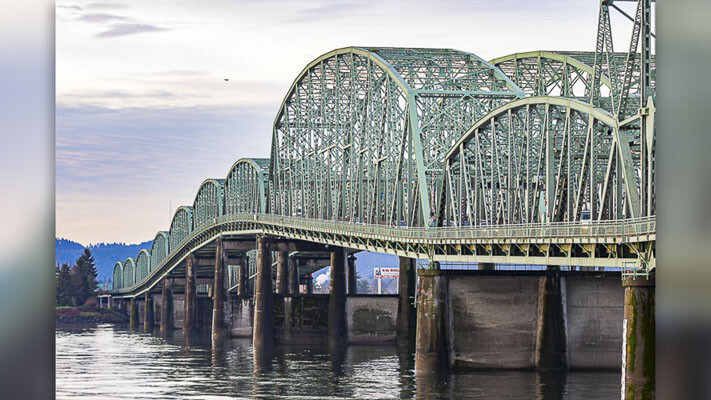
Senate Bill 5765 would open the door for tolling on the Interstate 5 Bridge replacement project
The Washington State House of Representatives passed Senate Bill 5765 on Tuesday, which would open the door for tolling on the Interstate 5 Bridge replacement project between Vancouver and Portland.
The bill would allow for tolls to be set by mutual agreement between the two state Transportation Commissions, and a toll account would be created for toll revenues.
18th District Reps. Greg Cheney, R-Battle Ground and Stephanie McClintock, R-Vancouver, 17th District Reps. Paul Harris, R-Vancouver and Kevin Waters, R-Stevenson, and 20th District Reps. Ed Orcutt, R-Kalama and Peter Abbarno, R-Centralia all voted against the bill.
Cheney sponsored an amendment to exempt Washington state residents who pay Oregon income taxes. He says Clark County is one of Oregon’s largest tax contributors.
“Clark County residents have paid about $2.2 billion in Oregon state income taxes over the past 10 years as they commute to Oregon for work,” said Cheney. “Layering on another form of taxation in the form of tolls is unreasonable and unnecessary. My amendment would have brought a sense of fairness to local commuters and prevented this form of double taxation. Unfortunately, the majority party voted it down.”
Cheney also thinks Clark County residents need to be aware of the potential tolling points as some commuters could end up being charged a toll even if they don’t cross the bridge.
“As written, the bill authorizes tolling south of State Route 500 which incorporates exits to downtown Vancouver as well as State Route 14. These could end up being tolling access points,” said Cheney. “Thus, it is entirely possible that many drivers would be forced to pay a toll to pay for a bridge that they’re not crossing. This is wrong and something that needs to be addressed.”
In addition to the amendment from Cheney, House Republicans offered six other amendments in an attempt to improve the bill, but only two were adopted, both from McClintock. One would direct the Washington tolling authority to require toll rates that specifically cover the Interstate 5 Columbia River bridge without subsidizing other Oregon toll facilities.
The other would require the toll rates to not be set at a rate that exceeds the highest toll rate allowed on any of the other toll facilities in Washington.
“I’m happy these two amendments were accepted to make this policy better by inserting some guardrails to protect Washingtonians. However, the constituents in the 18th district that I represent are not supportive of tolling which makes me a no vote on this bill,” said McClintock.
According to the Interstate Bridge Replacement Program Administrator, Greg Johnson, who represents both Washington and Oregon for the project, tolling is expected to begin in mid to late 2026, and bridge completion is expected by late 2031 at the latest.
The legislation states that tolling could not begin until the Washington Transportation Secretary determines there is a sufficient federal funding plan in place, sufficient state and local funds available to complete the bridge replacement project, and a bi-state agreement has taken effect.
The lawmakers expressed uneasiness that Washington residents are going to bear the brunt of the tolls.
“I am concerned that authorizing tolling for this project results in Washington residents paying a higher proportion of the costs – when they are already paying an unfair tax to Oregon,” said Orcutt.
The estimated cost of the project which spans a 5-mile corridor, is $5 billion to $7.5 billion, with the likely cost being about $6 billion. Funding is expected to come from several sources, including grants, $1 billion in funding from each state, up to $3 billion from the federal government, and $1.2 billion from tolling. The actual cost of the individual toll is still unknown.
Additionally, according to Johnson, it would likely be up to the Washington State Legislature and the Washington State Transportation Commission to determine whether the tolls would continue after the bridge is completed.
“The I-5 bridge replacement project is vital to everyone that uses the I-5 corridor, especially residents of Clark County,” added McClintock. “So, it’s imperative we get this project right for the people it will affect the most.”
Because the bill was amended, it will now go back to the Senate for concurrence, before being sent to the governor.
Information provided by Washington State House Republicans
houserepublicans.wa.gov
Also read:
- Plan ahead for ramp closures on I-5 near Ridgefield, July 9-10WSDOT will close three I-5 off-ramps near Ridgefield July 9–10 to test wrong-way detection systems and improve safety.
- Delays expected on Northwest 99th Street during water quality project constructionClark County will begin construction in July to install a stormwater filter vault on NW 99th Street. Drivers can expect delays, but lanes will remain open during the work.
- POLL: What’s the biggest concern you have with the current I-5 Bridge replacement plan?As costs rise and Oregon’s funding fails, concerns mount over the current I-5 Bridge replacement plan. Clark County Today asks readers: what’s your biggest concern?
- Plan ahead for ramp closures on I-5 near Ridgefield, July 8-9Travelers on northbound I-5 near Ridgefield should prepare for ramp closures July 8–9 as WSDOT crews conduct final testing of new wrong-way driving detection systems. The closures affect exits 9 and 11, including the Gee Creek Rest Area.
- Oregon DOT director calls transportation funding bill failure ‘shocking,’ warns of layoffsODOT Director Kris Strickler warned staff that up to 700 layoffs are imminent after lawmakers failed to pass a transportation funding bill, deepening the agency’s $300 million shortfall.









